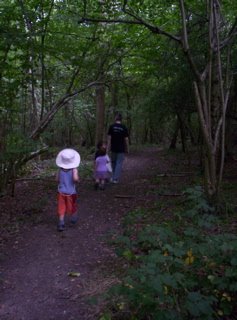The boys will make much better progress, I'm sure, with general knowledge topics connected to science or geography or history etc., if they have already mastered the rudiments of reading and writing.
So we looked at vowels again, in more detail. We played a whole series of word games every day, on paper and on the whiteboard, such as Spot the Missing Vowel or Name this Dipthong! Of course, I kept it light and as basic as possible. They did not tend to use words of more than three letters for the first few days, looking at Consonant - Vowel - Consonant words until they seemed comfortable with the concept of vowels.

"We're Going on a Bear Hunt"
Missing Vowels:
w _ l k
w_ _ d
h _ t
d _ r k
b _ _ r
I then took the chance of introducing consonants. This is rather earlier than I had originally intended to introduce them, but the boys are going very well indeed with the current pace of work and I didn't want to hold them up. We sat down together and went through the entire alphabet in a book; the boys would read out each letter phonetically - they know them all off-by-heart now - and say whether or not it was a vowel. If it was NOT a vowel, I would write it on the whiteboard under the heading: CONSONANTS.
When they finished that exercise, we went through the list and thought up words that began with each consonant.
To finish up the week, I talked to the boys about simple dipthongs like 'ch' and 'sh', and our games moved on to longer common words such as 'shell', 'shoe', ship' and 'fish'. It was a moderately difficult exercise but useful in terms of drawing their attention to the length and shape of words, and to visual patterns inside the words themselves. We also touched on alliteration, thinking up lists of words beginning with the same letter. That was quite hard for them to do and I think perhaps a few games of 'I spy' might help them associate the 'sounds' of words like chair and table with the actual look of the initial letter. After all, their understanding of the world has been based around sounds so far; with the advent of reading it has to shift more towards visuals.
As for numeracy, I'm extremely pleased with their progress. Both boys can now count up to 20 with fair consistency and have started to learn the full rote of the 2 x Table, whereas before they were only counting in twos up to ten. Indeed, M. counts in twos at every opportunity. After a dodgy start at home schooling, due to a learning disability, I think he's now showing a real flair for mathematics, and the fact that he's better at something than his brother has given him a great deal of new confidence, which is spilling over into the literacy side of things, so that his reading is now improving at almost the same rate as his numeracy!

Amazing what a little healthy competition can do between twin brothers, though I'm sure the more politically correct attitude these days would be to discourage competition. But if it works and gets him trying harder, then I see no harm in it. It worked for the Kennedy family ...
We'll be back to normal activities in another fortnight, or at least once I feel the boys have really taken on board the skills required for basic competency in literacy and numeracy. I'm sure this new regime - with plenty of viva voce activities and board games - can do nothing but good.
2 comments:
Hi there - welcome to the blogring. Good to have you aboard, and looking forward to getting to know you better.
Hi Jax, thanks for the message. I try to post on this blog at least once a week ... and though this particular month is very busy for us, I'm hoping to keep to that schedule.
Post a Comment